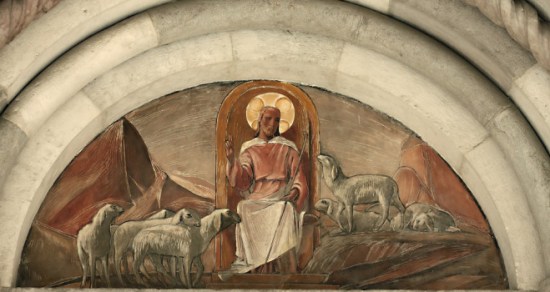Sermon of the Week
When God Breaks (Open) Your Heart
A sermon preached at The Kirk of Kansas City, Missouri, on May 12, 2019.
#pcusa
Keywords: Good Shepherd, Retribution, Reconciliation, Feed my Sheep
Scripture readings (which you may wish to read prior):
Psalm 23
and John 21:15-19
It should be no secret that I like to linger with these so called post-resurrection stories.
They’re the handful of episodes that the gospels record
about Jesus interacting with his friends and loved ones
after Easter morning, after the tomb is discovered open and Jesus himself not there.
There aren’t many of these stories. Not enough of them.
You get the stories of Easter morning
with all that frenetic energy and running back and forth.
John tells us about the closed and locked room
and Jesus coming back to fill Thomas in on the story.
Luke tells us about Jesus visiting some of his followers
when they’re on the highway out of town.
Both of them have a version of Jesus making a meal for them.
Luke and Matthew share with us Jesus’ final goodbye and ascension back to God.
Just a handful of stories.
They leave me wanting more.
The fourth Sunday of Easter is always Good Shepherd Sunday.
We read from the 23rd Psalm
and often from the 10th Chapter of John
where Jesus says “I am the good shepherd.”
When Jesus says that, that he is the Good Shepherd,
he explains that other voices claim to guide us, but they inevitably fail,
either because they’re not reliable, or they’re easily distracted,
or because they cannot give us the protection and care we actually need.
Jesus, on the other hand, is different.
Jesus offers healing when others say it’s the wrong time or place to heal.
Jesus offers welcome to those who are kept out.
Jesus offers forgiveness to those who are judged unforgivable.
Jesus offers peace for the troubled, and disrupted.
Unlike any other, Jesus’ compassion is steadfast and sure.
It is reliable.
And for those who stumble and search for direction,
as we all invariably do, Jesus is a safe and trustworthy leader.
That’s what Jesus means when he says he’s the good shepherd. And we the sheep.
///
I know we don’t really like to be called sheep.
Not this type-a, pull ourselves up by our boot-straps, driven and self-reliant culture.
But maybe we make too much of that metaphor in this regard.
Jesus seems to ask a lot of his sheep.
I’ve always liked how John offers a continuation of this theme
at the end of his Gospel
in one of those rare post-resurrection stories.
Jesus pass along this work, this responsibility,
this work of healing and feeding and tending and welcoming
to Peter, and through Peter, to all of us.
Listen for God’s word to us this morning
as I read the scripture lesson from the Gospel According to John.
15 When they had finished breakfast,
Jesus said to Simon Peter,
‘Simon son of John, do you love me more than these?’
He said to him, ‘Yes, Lord; you know that I love you.’
Jesus said to him, ‘Feed my lambs.’
16A second time he said to him,
‘Simon son of John, do you love me?’
He said to him,
‘Yes, Lord; you know that I love you.’
Jesus said to him, ‘Tend my sheep.’
17He said to him the third time,
‘Simon son of John, do you love me?’
Peter felt hurt because he said to him the third time,
‘Do you love me?’
And he said to him,
‘Lord, you know everything;
you know that I love you.’
Jesus said to him, ‘Feed my sheep.
18Very truly, I tell you,
when you were younger,
you used to fasten your own belt
and to go wherever you wished.
But when you grow old,
you will stretch out your hands,
and someone else will fasten a belt around you
and take you where you do not wish to go.’
19(He said this to indicate the kind of death by which he would glorify God.)
After this he said to him, ‘Follow me.’
And may God bless to us our reading, and our understanding, and applying of this word, to how we live our lives. Amen.
///
We spend Six Sundays in the Season of Easter.
We might be forgiven if the experience of this year’s Easter proclamation
feels like it is fading a bit into memory.
Before that happens, lets reflect a bit on something
that often goes unnoticed.
One of the things about Jesus that I’ve found remarkable
is his lack of vengeance, or retribution.
Nowhere does it suggest that, when Jesus rose from the dead,
that he had revenge in his heart.
I think this is one of the yardsticks
I use to measure what someone is saying about God:
is the God they offer a wrathful, vengeful God?
Is the path they offer based on joy, because of God’s gracious gifts and protection,
an experience that life and love will win?
or is it based on fear, founded on worry that God is angry at you?
Jonathan Edwards, that titan of early American Christianity
famously preached a colonial-era sermon entitled
“Sinners in the Hands of an Angry God”
which, apparently, so-stirred a guilt-ridden puritan population
during the great awakening, that they passed out in the pews
and called out to the preacher: “what can I do to be saved?”
It was a different time.
But the street corner preachers of Chicago, where I went to graduate school,
sometimes offered a version of this theology.
I think it persists a lot in fearful corners of the church, even today,
to my great sadness.
But look closely: Jesus did not bring violence, anger or retribution
upon those who plotted to kill him.
He, instead, brought forgiveness, reconciliation and peace. [Read more…]


